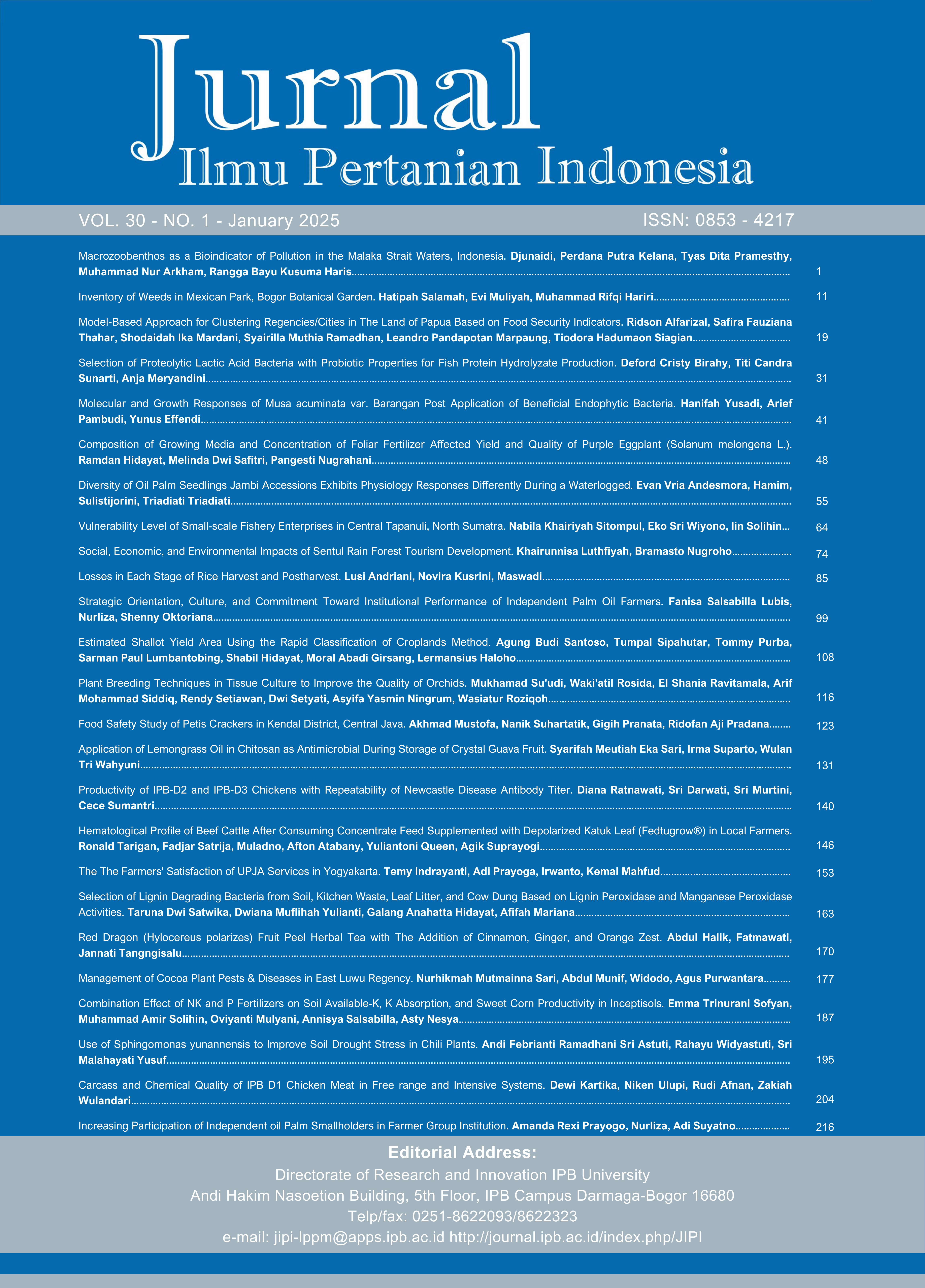Productivity of IPB-D2 and IPB-D3 Chickens with Repeatability of Newcastle Disease Antibody Titer
Abstract
ND virus causes mortality in poultry. Passively acquired maternal antibodies inhibit immunoglobulin formation. Repeatability is a genetic parameter that determines the inheritance of traits from elders to chicks. IPB-D2 chickens were selected for disease resistance, and IPB-D3 chickens were selected for weight gain. This study aimed to evaluate the productivity of IPB-D2 and IPB-D3 chickens and assess the inheritance of Newcastle Disease (ND) antibody traits in 36 IPB-D3 and 21 IPB-D2 chickens. The T-test was used to compare the group means of the two chicken breeds. Antibody titer measurements were based on the Geometric Mean Titer (GMT). Estimation of ND titer repeatability using within-class correlation. Fertility and hatchability differed significantly (p < 0.05). ND titer of IPB-D2 chicken and IPB-D3 chicken DOC LOG 2 GMT 1.61 ± 1.10 and 1.34 ± 0.95. The antibody titer of IPB-D2 and IPB-D3 chickens at 14 days of age was 1.02 ± 1.20 and 1.37 ± 0.95. The ND titer value in the egg yolk of IPB-D2 chicken was 4.02 ± 1.94, and in IPB-D3 chicken was 3.64 ± 2.54. The results showed the repeatability value of l antibodies in IPB D-2 chickens and IPB D-3 chickens in DOC 0.49±0.30, 0.42±0.33 and 0.39±0.28; 0.25±0.15, respectively. Fertility and hatchability of IPB-D3 chickens were better than those of IPB-D2 chickens. The yolk ND titer of IPB-D2 chickens was higher than IPB- D3 chicken. The ND titer reciprocity of IPB-D2 chickens was higher than that of the IPB-D3 chickens.
Keywords: IPB-D2 Chicken, IPB-D3 Chicken, Newcastle Disease, productivity, repeatability
Downloads
References
Al Habib MF, Murtini S, Cyrilla L, Arief IL, Mutia R, Sumantri C. 2020. Performa pertumbuhan ayam IPB-D1 pada perlakuan pakan dan manajemen pemeliharaan yang Berbeda. Jurnal Agripet. 20(2): 177–186. https://doi.org/10.17969/agripet.v20i2.16375
Angreini M, Balqis U, Hasan DI, Aisyah S, Salim, MN. 2023. Newcastle disease case in broiler chicken. Jurnal Medika Veteneria.17(2): 57–61.
Bagus I, Indra K, Bagus I, Suardana K. 2023. Deteksi antibodi maternal Newcastle disease pada broiler. Jurnal Veteriner. 15(8): 112–119. https://doi.org/10.24843/bulvet.2023.v01.i01.p15
Becker, W. A. 1985. Manual of Quantitative Genetics. Washington: Students Book Corporation.
Darwati S, Afnan R, Nurcahya, Widayanti, N. 2019. Produksi telur dan reproduksi ayam silangan antara ayam merawang dengan ayam arab serta pendugaan nilai ripitabilitasnya. Jurnal Peternakan Indonesia. 21(2): 102–108. https://doi.org/10.25077/jpi.21.2.102-108.2019
Hako Touko BA, Kong Mbiydzenyuy AT, Tumasang TT, Awah NJ. 2021. Heritability estimate for antibody response to vaccination and survival to a newcastle disease infection of native chicken in a low-input production system. Frontiers in Genetics.12: 1–18. https://doi.org/10.3389/fgene.2021.666947
Han S, Wen Y, Yang F, Hep. 2021. Chicken egg yolk antibody (IgY) protects mice against enterotoxigenic Escherichia coli infection through improving intestinal health and immune response. Frontiers in Cellular and Infection Microbiology. 11: 1–14. https://doi.org/10.3389/fcimb.2021.662710
Handayani AN, Ong S, Kusumastuti A. 2015. Respons antibodi terhadap penyakit tetelo pada ayam yang divaksin tettelo dan flu burung. Jurnal Veteriner. 16(15): 283–290.
Hawari MF, Sumantri C, Darwati S. 2024. Egg production and quality of IPB D3 chicken and it’s repeatability estimation. Jurnal Ilmu Produksi dan Teknologi Hasil Peternakan. 12(1): 8–13. https://doi.org/10.29244/jipthp.12.1.8-13
Kencana GA, Astawa NM , Mahardika IGN, Gorda IW. 2012. Penyebaran virus vaksin ND pada sekelompok ayam pedaging yang tidak divaksinasi dan dipelihara bersama ayam yang divaksinasi. Buletin Veteriner Udayana. 4(2): 109–117.
Khairiyah AU, Sumantri C, Murtini S, Anang A. 2023. Production performance of debu and kelabu sentul chicken at different igy concentrations. Jurnal Ilmu Produksi dan Teknologi Hasil Peternakan. 11(2): 73–79. https://doi.org/10.29244/jipthp.11.2.73-79
Lestari. D. tahun. Identification of dna gen diversity and its association with total igy concentration and ND antibody titer of IPB-D1 chicken. [Tesis]. Bogor (ID): Institut Pertanian Bogor.
OIE. 2012. Newcastle disease. Manual of Diagnostic Tests and Vaccines for Terrestrial Animals. [internet]. [accessed 2023 Des 21]. http://www.oie.int/international-standard. setting/terrestrialmanual/access-online.
Nataamijaya A, Setioko, Dwiyanto K. 2003. Performan dan karakteristik tiga galur ayam lokal (pelung,sentul, arab). Puslitbang peternakan. Seminar Nasional Teknologi Peternakan dan Veteriner. Bogor (ID): 29 September 2003.
Niewiesk S. 2014. Maternal antibodies: Clinical significance, mechanism of interference with immune responses, and possible vaccination strategies. Frontiers in Immunology, 5: 1–15. https://doi.org/10.3389/fimmu.2014.00446
Noor RR. 2008. Genetika Peternakan, Bogor. Jakarta: Penebar Swadaya.
Okwor GO, El-Yuguda A, Baba SS. (2014). Profile of Maternally Derived Antibody in Broiler Chicks and In-Ovo Vaccination of Chick Embryo against Newcastle Disease. World Journal of Vaccines. 04(02): 72–80. https://doi.org/10.4236/wjv.2014.42009
Risza H, Dyah AH, Risa I. 2014. Phylogenetic analysis of genotype VII of new castle disease virus in Indonesia. African Journal of Microbiology Research. 8(13): 1368–1374. https://doi.org/10.5897/AJMR2014.6601
Salsabila N, Sumiati S, Suryati T. 2022. Suplementasi vitamin E pada level nutrien ransum berbeda untuk meningkatkan pertumbuhan dan mengatasi cekaman panas pada ayam lokal IPB-D3. Jurnal Ilmu Nutrisi dan Teknologi Pakan. 20(2): 58–65. https://doi.org/10.29244/jintp.20.2.58-65
Setyaningsih R, Murtini S, Poetri ON, Sumantri, C. 2020. Respons kekebalan tubuh ayam IPB D1 terhadap infeksi virus penyakit tetelo (newcastle disease). Jurnal Veteriner. 21 (1): 83–89.
Setyawati M, Ulupi N, Murtini S, 2019. Pengaruh Konsentrasi IgY Induk yang berbeda terhadap Gambaran Darah Anak Ayam Sentul. Jurnal Ilmu dan teknologi Peternakan. 6(2): 273–277. https://doi.org/10.33772/jitro.v6i2.7609
Suardana KBI, Dewi KRM, Marhadika KMB.2009. Respon imun itik bali terhadap berbagai dosis avian influenza H5N1, Jurnal Veteriner. 10: 150–155.
Susanti F, Sri M, Wibawan IWT. 2020. Respons Kekebalan Ayam IPB D1. Jurnal Veteriner.21(1): 83-89.
Walugembe M, Mushi JR, Amuzu-aweh EN, Chiwanga GH, Mso PL, Wang, Saelao P, Kelly T, Gallardo RA, Zhou H, Lamont SJ, Muhairwa A., Dekkers JCM. Genetic analyses of tanzanian local chicken ecotypes challenged with Newcastle disease virus. Journal Gen. 10: 546–548. https://doi.org/10.3390/genes10070546

This work is licensed under a Creative Commons Attribution-NonCommercial 4.0 International License.
This journal is published under the terms of the Creative Commons Attribution-NonCommercial 4.0 International License. Authors who publish with this journal agree to the following terms: Authors retain copyright and grant the journal right of first publication with the work simultaneously licensed under a Creative Commons Attribution-NonCommercial 4.0 International License. Attribution — You must give appropriate credit, provide a link to the license, and indicate if changes were made. You may do so in any reasonable manner, but not in any way that suggests the licensor endorses you or your use. NonCommercial — You may not use the material for commercial purposes.























